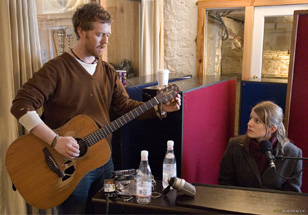2008 Calvin Awards: Best Use of Music
February 19, 2008
BoxOfficeProphets.com

Our favorite film in this category for 2007 – by a significant margin – was Once, the "musical that doesn't really feel like a musical". From the very outset of the film when we see Glen Hansard as a busker on the sidewalk to the glorious duet "Falling Slowly" to the band's recording sessions, the songs created by Hansard and Marketa Irglova are a joy to hear and a celebration of what it means to love
The runner-up for Best Use of Music is Juno, which has an awesome indie soundtrack that slots in perfectly with the movie's quirky sensibilities. With many of the tunes handpicked by star Ellen Page, it seems as though every song is perfectly attuned to the scene it accompanies. Things get started with the opening credits, as a Sunny D-carrying Juno walks through the streets to Barry Louis Polisar's "All I Want Is You". Kimya Dawson has several tracks as well, and classics from The Kinks and Buddy Holly are well used. Of course, there might be nothing sweeter than Juno and Paulie Bleeker singing "Anyone Else But You" as the credits roll.
Our third selection was the cause of a bit of controversy in the BOP offices. No Country for Old Men had enough advocates to place highly. Those who haven't seen the film will be wondering why some of our staffers are up in arms, but those who have might be curious as to how a movie with little to no music could win in this category. One of the proponents for No Country in this category put it this way: "I thought that the "use of music" (i.e., pretty much none) was far more effective in this movie that the same interchangeable music (be it the latest pop song or the latest James Horner crap) in nearly every any other movie." The rest of us will just agree to disagree.
We go to the other end of the spectrum with Atonement, which made spectacular use of a typewriter-infused score to move its action, which is centered on a fanciful young girl whose imagination runs wild when she witnesses a terrible incident. The typewriter is thematically relevant throughout the film, as the young lady in question is working on a play at the beginning of the film. Later, a critical letter is likewise composed on a typewriter, and finally, the end scene comes full circle to take us inside a writer's mind. Composer Dario Marianelli is really developing creatively, as scores for Atonement, Pride & Prejudice and V for Vendetta have proven.
Next up is Hot Fuzz, which follows in the footsteps of Shaun of the Dead to incorporate an outstanding soundtrack to match the movie's themes all while managing to be funny as hell. Examples include Dire Straits' "Romeo and Juliet" playing on the radio at the scene of a crash involving two lovers as well as Arthur Brown's "Fire" sounding in the background as a man burns. There are also police-themed songs like "Caught by the Fuzz" (Supergrass), "Here Comes the Fuzz" (Jon Spencer Blues Explosion) and music lifted directly from movies being parodied, such as Lethal Weapon 3, Point Break and Bad Boys II.
Sixth and seventh place both belong to a pair of movie musicals, albeit two with very different tones. The first of them is the upbeat but subversive Hairspray, which uses tunes from the Broadway musical to punctuate its tale of a young (fat) girl who wants nothing more than to dance on a local television station. Newcomer Nikki Blonsky is marvelous in her tunes, and there are terrific songs from the likes of James Marsden, John Travolta, Queen Latifah and High School Musical's Zac Efron mixed in as well. At the other end of the spectrum is the dark Sweeney Todd, which does a fine job of updating the bleak Stephen Sondheim musical for the theatrical experience.
Rounding out the top ten are the score for There Will Be Blood, itself a character in the film, Music & Lyrics and Ratatouille. Many people felt that There Will Be Blood's omission from the Academy Awards score category due to a technicality was a tragedy, but Radiohead's Jonny Greenwood did masterful work, especially when you combine his music with Fratres by Arvo Part and the Brahms Violin Concerto. Music & Lyrics might belong here for no other reason than opening song/video "Pop Goes My Heart," which will leave you in stitches. And finally, Michael Giacchino's score for Ratatouille set the perfect Parisian mood.
Movies that just barely missed the top ten in the Best Use of Music category include Black Snake Moan, Superbad, Knocked Up and Grindhouse. (Kim Hollis/BOP)
Best Actor
Best Actress
Best Album
Breakthrough Performance
Best Cast
Best Director
Best DVD
Best Overlooked Film
Best Picture
Best Scene
Best Screenplay
Best Supporting Actor
Best Supporting Actress
Best TV Show
Best Use of Music
Best Video Game
Worst Performance
Worst Picture